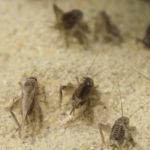Tag Archives insects

ADM, InnovaFeed to build world’s biggest insect protein plant in Illinois

Neonic ban decision expected in six months
Health Canada said it now has further information to consider in making its decision

Milkweed key to building monarch butterfly numbers
Science Notes: Monarchs appear to successfully migrate, but there’s concern about declining numbers

VIDEO: Western Bean Cutworm
Field Talk with Matt Rundle: Ideal timing for scouting of WBC is now

Large cricket farm coming to London
Aspire Food Group says it will be the largest of its kind in the world

Resistant trees found to resist ash borer
Science Notes: Gene editing could place resistance genes into ash species currently affected by EAB

Genetically engineered moth could help control pest populations
Science Notes: The diamondback moth damages brassica crops such as cabbage and broccoli
Pest lessons learned in the 2019 Ontario crop year
Ontario Field Crop Report for the week of September 23

Is mowed milkweed better for monarchs?
Science Notes: Research shows that monarch butterflies prefer younger milkweed plants

Supporting beneficial insects during lean times
Researchers find ways to perpetuate beneficial insect populations in greenhouses
